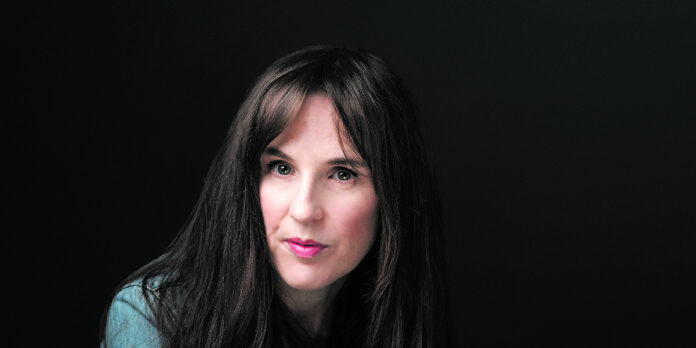After four critically acclaimed, award winning novels, Claire Kilroy went missing for 11 years, or so it seemed.
Finally in 2023 she resurfaced with another acclaimed work, the theme of which gave an indication as to why she had been absent from the literary scene for so long.
In Soldier Sailor, which was described by The Observer as “an astonishing high wire act” and by the London Times as containing “the best 30 pages of fiction you’ll read this year” , she delves into the chaotic early years of motherhood, and how a woman’s sense of identity can be deeply challenged at that time.
It’s something many parents will relate to, and she has loved the feedback she has received.
“I’m doing a thing a writer isn’t meant to do and reading Goodreads. Readers put up their thoughts on Goodreads and some of the comments are moving to me, genuinely moving,” she said.
“It’s so long since I published a book and then there were the newspaper reviews and that was the end of it. Now you do hear what your readers think.”
Earlier in her career, the books were coming in long but regular cycles.
“I published my first in 2003, then 2006, then 2009, then 2012. And then I had a baby in 2012,” she said.
She actually didn’t stop writing, or at least didn’t stop attempting to write.
“It wasn’t for lack of trying and it wasn’t because I took time off to be a mother. I was trying the whole time to write. But it’s very hard, especially in Ireland, where childcare isn’t subsidised and if you’re a writer you aren’t salaried. Women are expected to do most of the parenting. That is changing but it hadn’t changed back then. It wasn’t because I had decided to be a stay at home mother.”
Delighted with her son’s arrival, she was also shocked at how different life was.
“We had this brilliant baby, and I don’t know why I was so unprepared. I don’t know why none of us understand it until it happens,” she said.
“It is a mammoth change, and it is amazing, but it’s very unsupported I find.”
Some of what she had believed about balancing work and family was exposed as overly idealistic.
“I suppose the generation of women that I’m from were raised to think we could have it all, we could have careers and be mothers. The great discovery was that you can’t, it’s just too much work,” she said.
Few if any parents would say that having a first child is anything other than a huge jolt, but Claire felt there was a lack of openness about how challenging being a mother is.
“When I was writing the book and when my child was young, mothers didn’t want to talk about how hard it is, so I thought it was just me. But to read these comments [on Goodreads] now.. I find it emotional that other people are connecting.”
As hard as being a new mother was, she was conscious that many parents had far greater challenges. “It is amazing, and I was so grateful to have a healthy child. He had a minor hip problem and I had to go into Temple Street every week when he was a baby. You saw there what happens if your child had additional requirements or severe stuff going on. Again, there’s no support. I remember overnighting in Temple Street and I was talking to the parent opposite. Their child had to overnight in Temple Street for half the year for her very complex needs. They would sleep on a chair and get up and go to work, while the other parent was at home with their other child. Jack and Jill came in during the day, then it was back to sleep in a mixed ward full of crying kids.”
She actually went back to writing very soon after giving birth, but it took more than a decade to get Soldier Sailor into book shops. “I was always trying to write it, because I believed you could be a mother and do it all. I was trying to write it from when he was three months old. I read reviews that said she took a break. I was like ‘no, she was trying and failing and trying and failing’. The trying and failing went on for the 11 years.”
Eventually she was able to get a bit more time to write, but it was still challenging, and the experience of motherhood had changed the type of writer she was. “Step one was to give up writing to get a job to pay for childcare. I hadn’t had a job for years, because the writing had been kind of keeping me going. But to write I’d have to buy my time, by paying for childcare. I got a job teaching creative writing in the US and that paid me, so then I had an income and could afford childcare. So I became much freer to write when he was two and a half. There were still very short blocks of time and everyone’s different, but the blocks of time weren’t long enough for me. A lot of the time I sat down and cried, not with sorrow, but with the emotion of what I felt for this child.
“I didn’t want to write this book, I wanted to write one of my old books, to write about art or have some thriller aspect to it. But all I had was my love for this kid and how hard it all is.
“That became the book. I didn’t want to write about motherhood, but that’s what I was, that’s all I had left and that’s all my imagination could give me.
“So that’s what the book became, me talking to my child, telling my child what it was like, because nobody remembers anything before the age of two.”
While the book is about a difficult stage, she says it does get much better. “Oh God yes, it becomes fun after a while. This is about the pre-school, pre–language years.”
She is also surprised at how many friendships she has developed, through child related activity. “School is a game-changer. I’ve made loads of friends which was completely unexpected because I’m older now, you don’t think you’re going to make a load of friends in your forties. But some of my dearest friends now are from the school run, I really mean they are dear to me. We’re all from totally different walks of life, but we’re all invested in our kid. ”
She says she writes more emotionally now, and is currently writing a book in which WB Yeats is the narrator, and one of the major themes is the ending of boyhood. “You want your child to keep going and grow and be an adult. That’s the game, it’s the only game, to help your kid make it to adulthood well, but there’s also the knowledge of what’s been lost, that has to be lost, and you’re kind of mourning what is lost. The part that celebrates what’s gained is greater, but it’s such an interesting dynamic.”
Claire has been a guest at the Ennis Book Club Festival before, but this is her first novel for years and she is looking forward to it. “I remember my first Ennis festival clearly because it was such a committed crowd. They were into it, they had read the work, and when you meet people who are interested, it fuels you to write the next one. You work in a vacuum and when you go to something like this you come away feeling good and feeling energised so I was thrilled to get the invite.”
Claire Kilroy and Sinead Gleeson will be in conversation with Edel Coffey on Friday, March 1 at 4pm in the Temple Gate Hotel in Ennis.
Owen Ryan has been a journalist with the Clare Champion since 2007, having previously worked with a number of other publications in Limerick, Cork and Galway. His first book will be published in December 2024.


